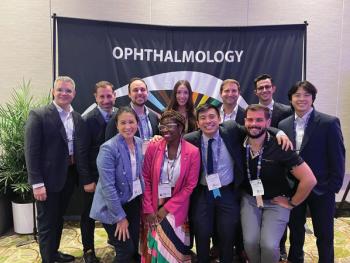
Jackson Memorial Lecture: Past, present and future outlook of retinoblastoma
“Retinoblastoma is a remarkable ophthalmology success story in which the efforts of ophthalmologists, ophthalmic pathologists, and research scientists have led to understanding of the basic mechanisms of cancer and targeted therapies that are able to cure a once incurable tumor,” said Hans E. Grossniklaus, MD, MBA. He was honored as the recipient of the 71st Jackson Memorial Lecture Award in the opening session of the annual meeting of the American Academy of Ophthalmology.
Chicago-“Retinoblastoma is a remarkable ophthalmology success story in which the efforts of ophthalmologists, ophthalmic pathologists, and research scientists have led to understanding of the basic mechanisms of cancer and targeted therapies that are able to cure a once incurable tumor,” said Hans E. Grossniklaus, MD, MBA. He was honored as the recipient of the 71st Jackson Memorial Lecture Award in the opening session of the annual meeting of the American Academy of Ophthalmology.
In his talk, titled “Retinoblastoma: 50 years of progress,” Dr. Grossniklaus discussed the advances that have occurred since Edwin Dunphy, MD, delivered his 20th Jackson Memorial Lecture, “The Story of Retinoblastoma.”
In addition, Dr. Grossniklaus highlighted the existing need to address socioeconomic barriers to medical care for affected patients.
“Our current challenge is not technological, but rather social,” said Dr. Grossniklaus, director of the L.F. Montgomery Laboratory, and founding director of the Ocular Oncology and Pathology Service, Emory Eye Center, Atlanta. “It is ensuring that children who live in developing low-income regions have access to adequate medical care for the diagnosis and treatment of retinoblastoma.”
Dr. Grossniklaus noted that Dr. Dunphy’s talk recounted the history of retinoblastoma from the 1500s to the mid-1960s. In it, Dr. Dunphy divided the history into four periods: prehistologic, histologic, enucleation, and irradiation/chemotherapy.
In discussing the next 50 years, Dr. Grossniklaus added three new periods represented by the period of molecular biology, the period of targeted therapy, and the period of global health awareness.
Discussing the period of molecular biology, Dr. Grossniklaus said that the most far-reaching advances in retinoblastoma since Dr. Dunphy’s lecture have been in the understanding of the genetics and molecular origins of the tumor and in the mechanisms of tumor progression.
Describing advances in targeted therapy, Dr. Dunphy said that the introduction of chemoreduction approaches-which use systemically administered chemotherapy plus focal consolidation techniques-has been a major advance. Intra-arterial chemotherapy has also emerged as a reasonable option for select patients, and intravitreal chemotherapy has become feasible due to the development of relatively safe injection techniques.
In addition, Dr. Grossniklaus noted that his group has been working on intraocular chemotherapy injection techniques for retinoblastoma, including suprachoroidal injection using a microneedle that allows drug delivery to the posterior aspect of the eye without entering the vitreous space.
Discussing the period of global health awareness and the need to ensure that children living in poor socioeconomic regions have access to adequate medical care, Dr. Grossniklaus cited regional statistics on new cases of retinoblastoma and 5-year survival rates. He said that while there are 200 to 300 new cases of retinoblastoma annually in the United States, 1,000 patients are newly diagnosed with this tumor in India and China each year.
Furthermore, the latter number will continue to increase as the result of expected population growth in Asia, but outcomes data show that 5-year survival rates in lower income developing countries are dramatically lower than in the United States and Europe.
Newsletter
Keep your retina practice on the forefront—subscribe for expert analysis and emerging trends in retinal disease management.












































